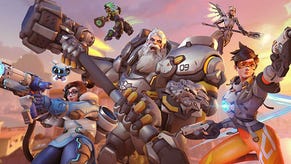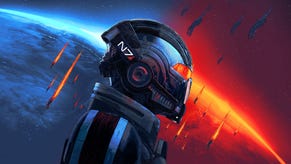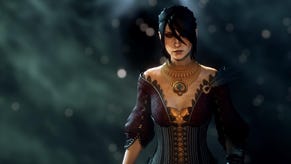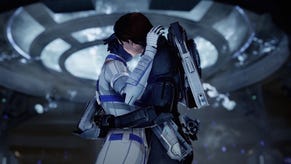Mass Effect 2
Of things to come.
Planet and space station design, whether as part of story missions or on side quests, is equally assured. While the Citadel - a futuristic meeting place and seat of the galaxy-policing Council - returns, you no longer visit its embassy lounges and wards but instead wander around its equivalent of the tax-free mall you usually find after security at the airport. (You are also armed with a map that actually helps you to navigate it.) New locations, meanwhile, are more exotic, and often double up as brilliant fan service.
Most locations are now home to multiple story missions too, and feel more like real places as a result. The grimy, corrupt and partially plague-ridden Omega station, for example, and the seductive Asari commerce planet of Ilium. Your activities are also more diverse, like using maintenance gantries to tail a politician, and it's not unusual for a mission to transport you to a separate area away from the throng of general planetary activity when it gets to the business end of proceedings.
If you can visit the surface of a planet, you won't be driving around for hours only to discover you don't have the tech skill to open a particular crate, either (in fact you won't be driving at all, as BioWare has ditched the Mako buggy). You can only land on hub planets or those that have a specific side-quest available, but the fact the latter "anomalies" lurk within dense systems of other planets that are ripe for mining enhances the feeling of exploration, while the rewards are more worthwhile financially and experientially.
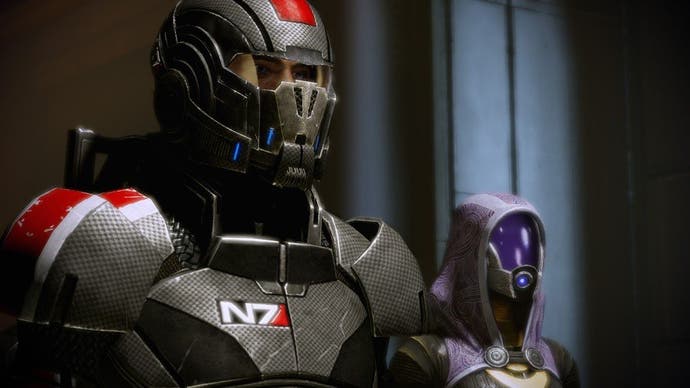
When you touch down, you may have to map a path through dense fog using laser beacons, or investigate the crash site of a space hulk teetering over a precipice, or rifle through records of a Cerberus operative's interrogation as his sad, mangled corpse lies nearby, and no two side missions are really alike in pace or tone. These extra planets are rarely as gripping as the main story, but they do an excellent job filling out the universe, and ensure that you really never do know what to expect when you circle for landing.
That main story is the star turn though, and one of the reasons is that it remains simplistic while a complex belt of orbiting social and political circumstances enhance its sense of gravity, inviting you to behave as your conscience guides but forcing you into situations that lack clear moral imperatives. Overall the events and places of Mass Effect 2 embellish the sensation, bred throughout the original, that space is every bit as mythological and diverse as the old worlds of high fantasy to which RPGs are so frequently and unimaginatively confined, but that in space it's rather more difficult to predict what you will encounter.
With the fate not only of the galaxy and your crew but the nature of your experience in Mass Effect 3 hanging in the balance, it's also easier than ever to suspend your disbelief and empathise with the characters you gather to your team, and when important decisions have to be made you feel the actual pressure of your own accumulated choices and future. Better than perhaps any RPG in recent memory, Mass Effect 2 even justifies the size of its ensemble by the time of its excellent conclusion, and it does more to develop your interest in fellow team members in the process, whether or not you end up liking them.
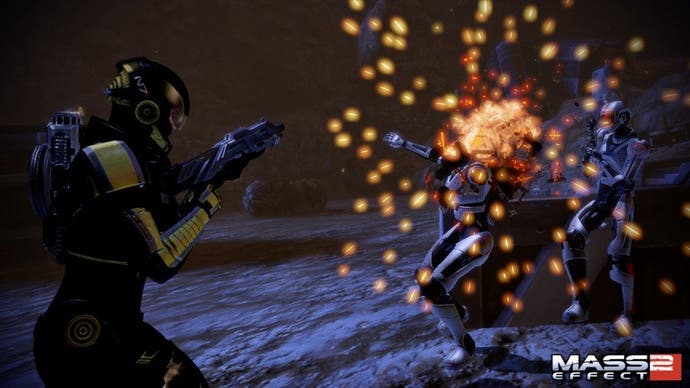
Even in a genre where depth and scale are frequently overwhelming, Mass Effect 2 was built upon staggering ambition - although to describe developer BioWare as ambitious is nothing new - but what is surprising is how well it handles the transition from original to sequel despite the need to support a variety of levels of experience and expertise, and how well it satisfies its players today while inviting anticipation for what must follow. Play it more than once, especially with different save-files to begin from, and it's hard not to admire the flexibility, and the way key decisions, friendships and experiences change the dramatic resonance of the story subtly but importantly. All this despite the greater heft and complexity of the universe and the game's broader branches and longer runtime.
Mass Effect 2 is more than an academic exercise, however, because whether or not you come to it afresh, and whether or not you ever see it through more than once, your experience won't just have been an acceptable storytelling throughline in a ludicrous simultaneous equation, it will have been fantastic adventure full of memorable characters, places and events that justify its grand scale and sober disposition.
In a generation of great RPGs, those accomplishments are magnificent individually but superlative in concert. Even so, perhaps BioWare's greatest success in Mass Effect 2 has been taking a complex RPG and making it effortless to understand, play and enjoy on a constant basis, because it has done this in a manner that should prove utterly essential to veterans and newcomers alike, and more than enough to suggest Mass Effect 3 will be the most important game in BioWare's history.


